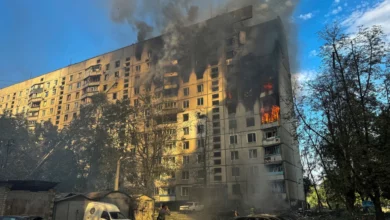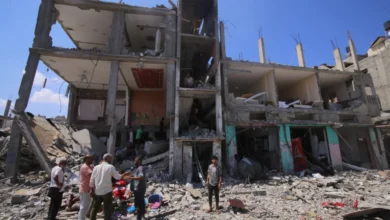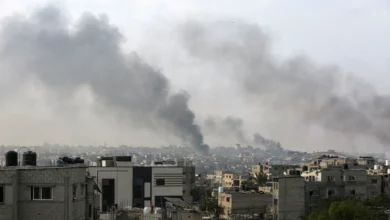Several events last week might imply that the regime in Egypt is robust, confident and determined to follow its chosen path undaunted by any obstacles. Those who hope for change are inclined to believe that the path to that goal is completely blocked.
This is the conclusion one can draw from the result of the run-off vote in the Journalists Syndicate election, the ferocious campaign mounted against ElBaradei, and the government’s decision to start building a steel wall on the border with Gaza. However, I believe that this is an erroneous interpretation that seeks to discourage the people that have not and will not cease to dream of change. So let’s examine the significance of the events of last week.
The outcome of the run-off vote for the Journalists Syndicate was governed by professional, rather than political, considerations. Syndicate members who decided to partake in the run-off after abstaining from the fist round of voting represented a "silent majority," people who don’t have a specific political stance, belong to an older age bracket, and are usually middle and upper-middle class. The overwhelming majority of those went for Makram, for reasons related to his professional attributes rather than his political positions.
Nonetheless, we shouldn’t underestimate the political significance of state interference in those elections, nor should we under-emphasize the state’s use of tactics that are normally reserved for totalitarian countries with rigged elections. From an ethical perspective, those are illegitimate methods that sabotage the integrity of elections, even if they seem impervious to incrimination.
I believe, like many others, that the youth and the proponents of change have led a respectable and honorable battle, and that the result of the run-off vote of the Journalists Syndicate doesn’t undermine the significance of the moral and political victory achieved in the first round. Therefore, I see no justification for the mood of pessimism that has started to infiltrate the writings of some friends.
The campaign launched against ElBaradei illustrates its perpetrators’ lack of confidence and exposes the serious ethical and political problems they suffer, whether they are the government, the state, or the National Democratic Party. Such a campaign also revealed the fragility of the regime, because on the ethical level it demonstrated the lack of criteria that should otherwise govern diversity and dissent as features of respectable political regimes.
When an internationally acclaimed figure like ElBaradei, who was honored by President Mubarak himself, is accused of having "dual citizenship," of being the "nominee of foreign countries," of "not knowing a thing about Egypt," and of "coming last in his class," simply because he uncovered the defects of the constitution amendments, this only means that the political game isn’t governed by any ethical or legal rules.
On the political level, the campaign against ElBaradei affirmed once again that the plans for inheritance of power still exists, and that the success of this project has become the main, and perhaps only, goal of the ruling elite.
Suffice to mention how the ruling regime dealt with the climate change summit in Copenhagen. The summit brought together 120 heads of states and governments to discuss climate change. Egypt wasn’t one of them, although Egypt tops the list of countries expected to be worst hit by climatic changes.
When a world expert like Mostafa Kamal Tolba says that Egypt dispatched a delegation of 40 persons, most of whom had no connection with environmental issues, to attend the summit, it becomes evident how the Egyptian state only detects dangers threatening the inheritance project. Any other forms of danger are outside the regime’s interest. If the smear campaign against ElBaradei doesn’t aim to protect the transfer of power, what else was behind it?
The campaign also turned the spotlight on the weakness and confusion of the regime. When an entire political regime is rocked as though by an earthquake simply by a well-reputed figure not ruling out the possibility of running for elections, what is the state of such a regime?
Still, it is clear as day that such a pathetic campaign hasn’t discouraged ElBaradei, nor has it weakened his determination to help find a way out of the current crisis, as he affirmed to me in a phone call.
Finally, let’s address the issue of the steel wall. It wasn’t the Egyptian opposition that made it up, because the story ran in Israeli papers, and then senior American officials and international employees affirmed the news.
The Israeli daily Haaretz published a detailed report last Wednesday that said that Egypt had, in fact, begun building a steel wall that extends 30 meters underground and nine to ten kilometers on its borders with Gaza. The decision, the paper said, comes in response to pressure by the US which had previously supplied Egypt with advanced equipment to prevent the smuggling of weapons.
The next day US Deputy Assistant Secretary of State Jeffery Feltamn confirmed the news in an interview with Al-Jazeera, though he denied that by building the wall Egypt was bowing to pressure from the US. He said Egypt is doing what it sees serves its national interest and security.
Then came the statements by Karen AbuZayd, the Commissioner-General of the United Nations Relief and Works Agency for Palestine Refugees in the Near East, who said that the wall, which is financed by the US, is being built according to an agreement between the US and Israel only hours before former American President George W.Bush left office.
Still, Egyptians officials don’t find such declarations worthy of a response. When the spokesperson for the Foreign Ministry was asked about the issue, he neither denied the news nor confirmed it. He only said that Egypt has "nothing to say concerning this issue at present."
The chief editor of Al-Gomhurriya, a national newspaper, stated in an editorial that the wall currently being built is the same one that already stands, except that its foundation will extend underground.
Anyway, whether the regime has put up a steel wall to block off the besieged Palestinian people or not, and whether the regime admits to building such a wall or not, neither case will change anything. A regime that has blocked off its own people might expectedly build a wall to block off others.
Is there a wall more massive than Article 76 of the Constitution which was formulated to prevent competent, honest Egyptian citizens, such as ElBaradei, from running for presidential elections?
Steel walls won’t be able to prop up an already crumbling regime. Will the regime come to terms with this fact before it’s too late?
Translated from the Arabic Edition.




